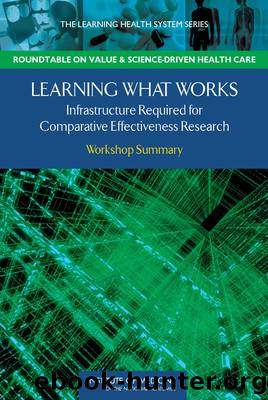Learning What Works by Claudia Grossman

Author:Claudia Grossman
Language: eng
Format: epub
Publisher: The National Academies Press
Published: 2014-06-16T00:00:00+00:00
BUILDING THE TRAINING CAPACITY FOR A HEALTH RESEARCH WORKFORCE OF THE FUTURE
Steven A. Wartman, M.D., Ph.D., M.A.C.P., President, Association of
Academic Health Centers; and
Claire Pomeroy, M.D., M.B.A., Vice Chancellor, Human Health Sciences,
School of Medicine, University of California at Davis
Overview
âInstitutions must transcend traditional boundaries to generate new ideas and technologiesâ¦. And link science with policy and governance to frame questions and foster social change.â (Bawa et al., 2008)
âIf medicine is to fulfill her great task, then she must enter the political and social life.â (Rudolf Virchow, 19th-century physician)
A national consensus is emerging that the U.S. healthcare system needs a fundamental retooling as to its purpose and function. This conclusion is driven mainly by the expensive costs of the current system in the context of significant variations in the basic health parameters that reflect the well-being of American society. For example, the current healthcare delivery paradigm strongly incentivizes acute care and the provision of expensive, cutting-edge drugs and technologies to the insured. Missing in this model is a strong focus on facilitating access, incentivizing quality, prioritizing preventive care, and ensuring community-wide public health. When this is coupled with the large numbers of underinsured and uninsured citizens, the result is a fragmented and dysfunctional system that creates wide disparities amongst the population in terms of health and well-being (Wilper et al., 2008).
What is not often heard in the calls for change is the urgent need to develop a new kind of research infrastructure focused on health and health care that can guide and inform decision making during this time of needed and anticipated change in the health system. This requires the development of the evidence base for clinical practice in order to ensure that the health care delivered is both effective and optimal. The importance of enhancing and supporting CER is therefore critical and fundamental to a reformed health system. Indeed, a recent IOM Roundtable workshop has emphasized the kind of infrastructure that is necessary in order to learn which care is best (IOM, 2008).
Download
This site does not store any files on its server. We only index and link to content provided by other sites. Please contact the content providers to delete copyright contents if any and email us, we'll remove relevant links or contents immediately.
The Compound Effect by Darren Hardy(7571)
Tools of Titans by Timothy Ferriss(6955)
How to Be a Bawse: A Guide to Conquering Life by Lilly Singh(6697)
Deep Work by Cal Newport(5483)
Grit by Angela Duckworth(4742)
The Slight Edge by Jeff Olson(4725)
Discipline Equals Freedom by Jocko Willink(4641)
Wiseguy by Nicholas Pileggi(4595)
The Motivation Myth by Jeff Haden(4532)
Influence: The Psychology of Persuasion by Robert B. Cialdini(4185)
Year of Yes by Shonda Rhimes(4118)
The Four Tendencies by Gretchen Rubin(4027)
The Laws of Human Nature by Robert Greene(3955)
The Miracle Morning by Hal Elrod(3916)
The Confidence Code by Katty Kay(3570)
Eat That Frog! by Brian Tracy(3521)
Visual Intelligence by Amy E. Herman(3284)
Hyperfocus by Chris Bailey(3277)
Believe It to Achieve It by Brian Tracy & Christina Stein(3212)
